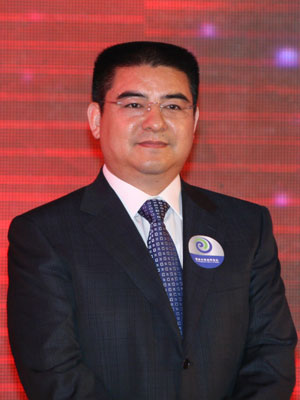 |
|
Chen Guangbiao, president of a recycling business in Jiangsu Province and a noted philanthropist. |
6,000 computers loaded onto 12 trucks, 10 brand-new Iveco cars lined up, US$1.46 million (10 million yuan) in cash. All of these – worth more than US$4.8 million (33 million yuan) – are the latest donations by Chen Guangbiao, president of a recycling business in Jiangsu Province and a noted philanthropist.
They will be sent to the quake areas in Sichuan Province, including Deyang, Mianzhu, Wenchuan and Beichuan, as well as underdeveloped areas in Xinjiang, Tibet, Inner Mongolia and Yunnan Province.
To date, Chen has made charitable contributions of more than US$117 million (800 million yuan), with over US$14.6 million (100 million yuan) in 2009. That represents a significant part of the whole nation's donations of US$70.3 million (480 million yuan) in the first quarter of 2009, according to Liu Jing, director of the China Philanthropy Times.
Keeping a high profile, Chen always invites the media to make a report on each donation. He says that what he has been doing simply aims to call on more people to care for these vulnerable social groups and give more attention to charity work.
Nicknamed "Brother Biao", Chen is greatly respected by all Chinese people, from government officials to ordinary teachers.
"I don't know where I acquired the nickname," said Chen. "I have been described as a philanthropist, an entrepreneur or a forward-thinking individual many times; however, I like this cute name 'Brother Biao' best."
According to Chen, this has been his 531st charitable donation. Along with a 5-meter-high pile of honor certificates, he has received 33 sacks of letters for help from across the country.
He likes to inspect poor areas in person before identifying to whom his donations should be presented and how much he will donate. "Donate what, to whom, and how much – that can't be estimated if I just read reports in the office. I have to make an inspection by myself," Chen said. "I always insist on participating in charity work with a clear mind."
He has therefore been trying to understand the needs in education and medical care in remote, underdeveloped areas for most of the past year. In April he made a 21-day visit to Yunnan, Xinjiang, Hunan and Sichuan, covering a distance of more than 5,300 kilometers by car.
"Only at the scene could you know what they really need. Take the bridge over the Nujiang River as an example, that was once a chain bridge when I visited. It was so dangerous for students to cross this bridge to go to school that I decided to donate money to build a proper bridge for them."
Chen is tireless in his charity work. According to his May schedule, he visited Inner Mongolia, Xinjiang, Tibet and Guizhou. "I want to pay more attention to the development of medical care and education in areas inhabited by ethnic minorities. My initial plan is to donate over US$146,000 (1 million yuan) for each ethnic group." Chen indicated that he'd like to work for promotion of national unity and improvements to these minority peoples' living conditions.
Moreover, Chen never denies the benefits he derives from his charity work. "As I donate more, more business is brought in to my company," he said. "I will contribute a certain proportion of the profits to serve society in return. What proportion? Whether 5 percent, 10 percent or 20 percent, that won't influence the development of the corporation."
(China.org.cn by Wang Wei, June 2, 2009)